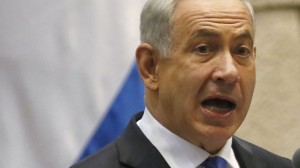 JERUSALEM Prime Minister Stephen Harper received a heros welcome to Israel Sunday, as his political counterpart lavished praise on him for being courageous and far-sighted.
JERUSALEM Prime Minister Stephen Harper received a heros welcome to Israel Sunday, as his political counterpart lavished praise on him for being courageous and far-sighted.You are a great friend of Israel and the Jewish people, Israeli Prime Minister Benjamin Netanyahu proclaimed at a formal welcoming ceremony for Harper, complete with marching band.
This world is often cynical and hypocritical and you have shown great moral leadership. When it comes to fighting terrorism, you know that there cannot be any politically correct double-talk. But only unequivocal condemnation and united international action.
Youve shown courage, clarity and conviction. And in standing up for the truth, your voice, Stephen, has been indispensable.
Harper, in reply, said he would save his substantive remarks for an address he was scheduled to deliver Monday to the Israeli legislature, known as the Knesset.
That speech, the first-ever by a sitting Canadian prime minister in Israel, will come just hours after Harper travels Monday to Ramallah, in the West Bank, to meet Palestinian Authority President Mahmoud Abbas.
The week-long trip, which includes stops in Israel, the West Bank and Jordan, is Harpers first trip to the region. Harper decided to make a big show of the trip by authorizing a large pro-Israeli delegation that will cost the Canadian taxpayers.
The official delegation consists of several cabinet ministers and some Conservative backbench MPs, and Conservative Sen. Irving Gerstein the Conservative partys top fundraiser who was embroiled last year in the scandal over Sen. Mike Duffys expenses.
As well, there are about 200 people from outside government in the official delegation including some senior business people, 21 rabbis, members of various Canadian Jewish groups and Christian evangelical organizations.
About 30 delegation members who flew with Harper are having their flights and hotel costs paid for by taxpayers, while those who flew on their own are getting accommodation covered by government.
The list of delegation members did not include any opposition politicians from Canada, nor did it appear to include members of any major Muslim or Canadian-Arab groups.
Since taking office, the prime minister has adopted a fiercely loyal policy in support of Israel that he says is based on principle.
But critics say Harpers policy on Israel is overly simplistic and has damaged Canadas reputation in the region as an honest broker that might be able to bridge long-standing differences between Israelis and Palestinians.
In his public welcome to Harper, delivered just before the two leaders went for a private dinner with their spouses, Netanyahu was effusive in his praise.
When it comes to anti-Semitism, youve stood up unabashedly at the side of Israel, the entire Jewish people. I think at the side of peace and fairness to everyone Jews and non-Jews alike.
And when it comes to Iran repeated calls for Israels annihilation and its unrelenting development of nuclear weapons you and Canada have stood unflinchingly on the right side of history.
Under Harper, Canada has treated Irans leadership with disdain, insisting that it cannot be trusted by the world.
Canada closed its embassy in Iran in August of 2012. Last autumn, when the United States and other major powers struck a six-month deal with Iran on its nuclear program, Canada refused to go along with the U.S. and others in describing it as a step forward.
Instead, as Netanyahu called it a grave mistake, Canadas foreign minister, John Baird, said he was deeply skeptical of Irans intentions.
Harpers trip comes at a critical time in the Middle East. U.S. Secretary of State John Kerry is trying to broker a peace deal between the Israelis and Palestinians.
Some intractable issues are on the table, including: Israels insistence that it be recognized as a Jewish state; Palestinian demands that generations of refugees be allowed to return to their homeland; possible border lines if Israel and Palestine reach a two-state solution; and the future of Israeli settlements in the West Bank.
Netanyahu praised Harper for adopting a wise policy.
When it comes to peace, you recognize that a genuine peace, a lasting peace, must be based on mutual recognition and sound security arrangements on the ground.
By The Vancouver Sun
The Iran Project is not responsible for the content of quoted articles










